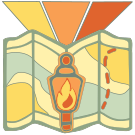Witnessing: Difference between revisions
imported>Jacob Robertson No edit summary |
No edit summary |
||
| (39 intermediate revisions by 2 users not shown) | |||
| Line 1: | Line 1: | ||
== | {{Lens | ||
|Name={{PAGENAME}} | |||
|LensShadowDescription=yes | |||
|AdditionalOverview=For example, while doing common tasks, practice relaxing your hold on the concept that you have some sort of consciousness that directs your actions. Try to be the most mindful you can, and simply let your hold on [[Association#Unlearn the Self|The Self]] go, riding the stream of events that takes you through the task. You can do these exercises while doing any task at all, not just chores, but it may be easier to start with simple household tasks that you do every day. | |||
=== Why === | |||
As you unlearn The Self, you should be able to apply that awareness in a progression something like this. | As you unlearn The Self, you should be able to apply that awareness in a progression something like this. | ||
* Small, rote tasks - combing your hair | * Small, rote tasks - combing your hair | ||
| Line 9: | Line 10: | ||
* Very complex tasks - writing a creative paragraph | * Very complex tasks - writing a creative paragraph | ||
* Long Durations - shopping | * Long Durations - shopping | ||
* Everyday Enlightenment | * Everyday Enlightenment - non-dual awareness becomes a regular part of how you experience life | ||
=== How === | |||
Each exercise will feel a little different, and there are some ideas below, but the general pattern is | Each exercise will feel a little different, and there are some ideas below, but the general pattern is | ||
* Start your task | * Start your task | ||
| Line 24: | Line 24: | ||
The exercises below may seem very prescriptive, describing exactly what to do at each step but do not approach them that way. These are just examples showing what someone might experience, and your experience will not follow the steps given. Instead, you will have to observe your own experience and then go back and reread the exercises to understand the objective. And then try again. | The exercises below may seem very prescriptive, describing exactly what to do at each step but do not approach them that way. These are just examples showing what someone might experience, and your experience will not follow the steps given. Instead, you will have to observe your own experience and then go back and reread the exercises to understand the objective. And then try again. | ||
|Beacon=Association | |||
|Sort=Lens_S01100 | |||
}} | |||
Latest revision as of 18:14, 20 September 2023
 | |
| Lens: Witnessing | |
|---|---|
| Beacons | Association |
| Landmarks | Extended Witnessing Have Experimented with Witnessing |
Lenses, in the context of the Beacons of Everyday Enlightenment represent more specific concepts and practices through which we can understand the rich meaning of each Beacon. There are Primary Lenses, which are the most commonly understood and most robust meditative concepts, and there are Other Lenses which are a collection of other closely related ideas for that Beacon.
Witnessing is a practice where one observes their own mind, thoughts, and emotions from a detached perspective. It's like being a neutral observer or "witness" to your own experiences, without judgment or attachment. This can be practiced in everyday life by consciously paying attention to your thoughts and feelings as they arise, without getting swept up in them. By becoming a "witness" to your own mental processes, you can gain a greater understanding of yourself and your reactions to different situations. The ultimate goal is to develop a greater sense of self-awareness and self-understanding, leading to increased control over your thoughts and emotions. For example, while doing common tasks, practice relaxing your hold on the concept that you have some sort of consciousness that directs your actions. Try to be the most mindful you can, and simply let your hold on The Self go, riding the stream of events that takes you through the task. You can do these exercises while doing any task at all, not just chores, but it may be easier to start with simple household tasks that you do every day.
Why
As you unlearn The Self, you should be able to apply that awareness in a progression something like this.
- Small, rote tasks - combing your hair
- More complex tasks - emptying the dishwasher
- Medium complex tasks - writing an email
- Very complex tasks - writing a creative paragraph
- Long Durations - shopping
- Everyday Enlightenment - non-dual awareness becomes a regular part of how you experience life
How
Each exercise will feel a little different, and there are some ideas below, but the general pattern is
- Start your task
- Become as mindful as you know how, let all thoughts evaporate, let go of any need to understand or control the moment
- Appreciate the task as a whole, sensing that it will get accomplished without you having to push it
- Begin to slowly appreciate the major steps or movements necessary to get the task done
- Once you have learned what you need from this "top down" approach, reverse the flow of observation...
- Note that the tiniest muscle movements you need for anything will never be under your conscious control - there are thousands of micromovements taking place each second
- Move up from that into an awareness of small movements that happen without any conscious thought
- Continue to move further up into the larger motions and how they also are simply taking place
- Finally note how decision making (such as when to change the comb to another hand) also do not require conscious thought
The exercises below may seem very prescriptive, describing exactly what to do at each step but do not approach them that way. These are just examples showing what someone might experience, and your experience will not follow the steps given. Instead, you will have to observe your own experience and then go back and reread the exercises to understand the objective. And then try again.
Landmarks
The Realms of Everyday Enlightenment each have some noticeable Landmarks which show the likely alignment someone within that Realm has with each of the Beacons and their various Lenses. These Landmarks are things that need to be noticed and explored in the context of those Lenses and Beacons. And then through working on the Trails and Guides these Landmarks will serve as markers toward the next Realm where new Landmarks await.
Landmarks of Enrollment
Landmark: Have Experimented with Witnessing
 | |
| Landmark: Have Experimented with Witnessing | |
|---|---|
| Beacons | Association |
| Realms | Enrollment |
| Lenses | Witnessing |
| Guides | Brushing Your Teeth |
The Landmark of Have Experimented with Witnessing asks whether you are able to experience basic Witnessing during simple tasks.
Review these questions to see if you have fully explored this Landmark and are ready to move on.
Landmark Lookouts:
- Awake to what Witnessing Is: Do you understand what you experienced, and does that understanding make you more awake?
- Experienced that at Least Sometimes There is no Controlling Mind to be Aware Of: Did you experience a full awareness that there were no thoughts, impulses, or any kind of directive force present?
This is just one example; it can be applied to any trivial activity. Note that you may not be able to do all of these steps at first - don't worry about that at all. Just try to understand the general flow and see which parts start falling into place for you. Also note that this exercise uses a mirror but that isn't a requirement at all - see also for example Emptying the Dishwasher.
- Stand in front of the mirror with your hands at your sides
- Become as mindful as you know how
- Look at yourself in the mirror and allow your attention to The Self to evaporate, and sense that the Mirror Self is going to do something
- Notice that the Mirror Self picks up the toothpaste
- Notice that the micromovements and larger movements for this simple task didn't need any conscious direction at all, it just happened
- The Mirror Self now lifts its other arm and unscrews the cap, placing it on the sink, and then picking up the toothbrush.
- Appreciate that three steps in one larger task all took place as if they were puzzle pieces fitting together seemlessly
- Continue on in this fashion as your teeth are being brushed
- Do not try and tell your Mirror Self which tooth to brush next or how long to linger on each tooth, just allow that to happen
- Do not try and tell your Mirror Self when the task is done, just let it end naturally
- Once you are done, and the toothbrush and toothpaste are back in their places, mentally review the steps listed in The Pattern above and appreciate what just happened
Landmarks of Engagement
Landmark: Extended Witnessing
 | |
| Landmark: Extended Witnessing | |
|---|---|
| Beacons | Association |
| Realms | Engagement |
| Lenses | Witnessing |
| Guides | Doing Chores |
The Landmark of Extended Witnessing asks whether you are able to experience a form of Witnessing for longer periods of time.
Review these questions to see if you have fully explored this Landmark and are ready to move on.
Landmark Lookouts:
- Understanding of Witnessing: Based on your practice, do you understand the goals and experience of Witnessing?
- Experience Witnessing Readily: Can you slip into the mode of Witnessing whenever you intend to?
- Prolonged Witnessing: When in a state of Witnessing can you maintain it (or at least shift back to it repeatedly) for more than a few minutes?
This is an example of a fairly complex task, but it involves repeating certain steps over and over, which is a chance to practice without judgement. If you find that you weren't able to stay mindful while taking one plate out, maybe you can for the next plate! Also, be sure to adapt these steps to how you personally like to empty the dishwasher, this might not be the way you do it.
- Open the dishwasher and look at the dishes
- Become as mindful as you know how
- Without trying to choose, allow yourself to pick up one dish
- Appreciate that you had no judgement or decision in which dish was picked up
- Appreciate the number of complicated micromovements necessary to pick up a dish
- Again, without any decision making, notice yourself walking to the cupboard
- Appreciate that walking also takes no conscious decisions, even though there are many parts that come together to make walking possible
- Continue on in this fashion until you find yourself back at the dishwasher, and appreciate the mindful nature of what you're doing
- Keep practicing being more and more mindful each time you put away a dish, you shouldn't need any thoughts or impulses whatsoever
- Once you are done take a moment to review the steps and concepts of Witnessing to appreciate what just happened
Landmarks of Enrichment
Landmarks for this Realm (Enrichment) will be added here when those pages are created.
Shadows
The Beacons of Everyday Enlightenment provide powerful guidance through the Realms. The Lenses represent different facets of those Beacons, which provide further focus or illumination of that Beacon. On the other hand, Lenses are also accompanied by two types of Shadows which tend to obscure our journey to Enlightenment. The first kind of Shadows are the Looming Shadows, which are the obvious opposite of a given Lens, and should hopefully be easy to avoid and train against once we understand them. The second kind are the Flickering Shadows, which could be confused with the associated Lenses, because they are quite similar to the Lens, while actually being a harmful or negative counterpart. Both types of Shadows should be understood in the context of the Lens and Beacon, and reviewed periodically to ensure our view is not obscured. Within the Lens of Witnessing, is the ability to shift into a state of Association where you are merely watching or Witnessing events in the moment, without any sense of The Self.
- Looming Shadow - Present Moment Denial, is a polar distortion of Witnessing - refusing to see the present moment as it truly is, and instead moving into a state of denial of reality.
- Flickering Shadow - Emotional Projection, is when an experience of Witnessing is tainted by Judgment or attaching values to The Now. For example, if you are in a very meditative peaceful state, it might seem natural to assign those same emotions to whatever you are Witnessing, rather than experiencing the reality of the moment.
